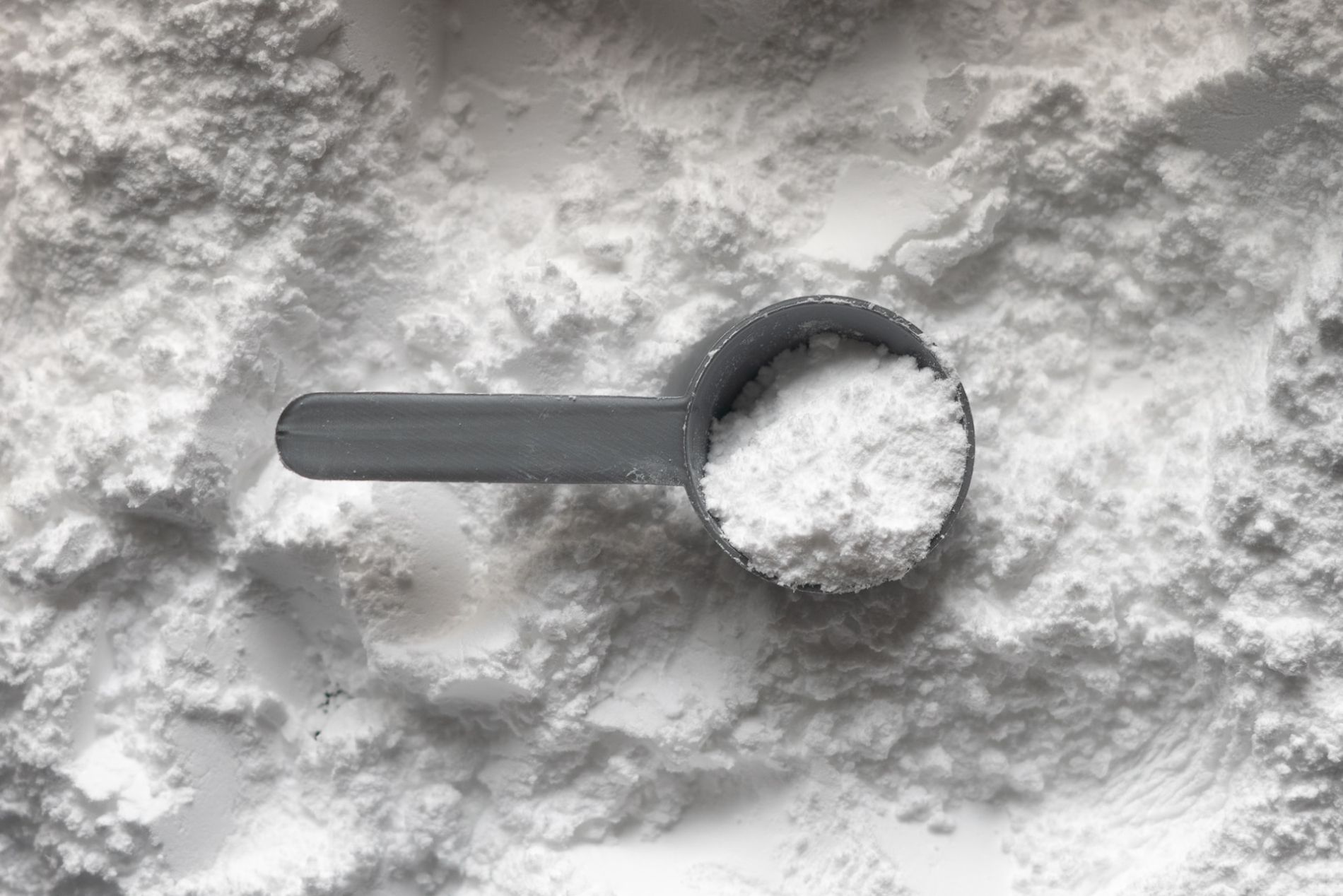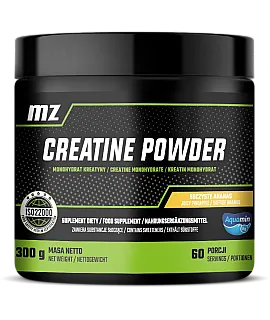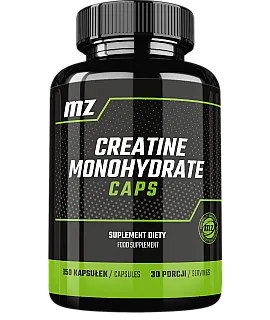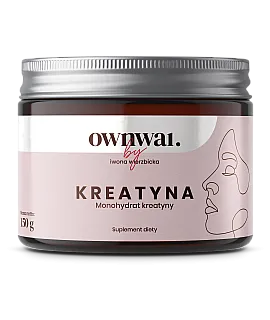What is creatine monohydrate and how does it work?

Creatine is one of the most popular dietary supplements among competitive and amateur athletes to increase power, strength and muscle mass. There are several types of creatine available on the dietary supplement market for athletes, of which monohydrate is the most common and used form. Let's find out what creatine monohydrate is and how it affects the human body.
- What is creatine monohydrate?
- How does creatine monohydrate work?
- What are the benefits of creatine monohydrate supplementation?
- Is creatine monohydrate only for gym-goers?
- Creatine monohydrate - dosage.
- Is creatine monohydrate safe?
What is creatine monohydrate?
Creatine is an organic chemical compound that is naturally produced in the human body (mainly in the liver and kidneys) from such amino acids as arginine, glycine and methionine. It mediates the metabolic changes taking place in skeletal muscles, the brain and other tissues of the human body, which have a high energy demand. Creatine monohydrate is a type of creatine that has the highest percentage creatine content (87.9%) of all available forms of creatine on the market. According to current knowledge, creatine monohydrate is the most effective, best researched and also the cheapest form of creatine currently available on the dietary supplement market for athletes. Creatine monohydrate is by far the best choice for all competitive and amateur athletes, as well as seniors and those requiring medical rehabilitation.
How does creatine monohydrate work?
Creatine monohydrate is a well-known ergogenic substance, that is, it enhances performance and fitness and speeds up the rate of post-workout recovery. Taking creatine monohydrate for several weeks causes a significant increase in the concentration of creatine in skeletal muscles, resulting in an increase in the body's ability to rapidly resynthesize adenosine triphosphate (ATP), the compound that is the primary source of energy during muscle contraction. Daily dietary supplementation with creatine monohydrate increases the total pool of cellular phosphocreatine, which speeds up the process of converting ADP (adenosine diphosphate) to ATP and consequently makes more energy available for high-intensity exercise. The increased energy availability promotes improved skeletal muscle strength and power.
What are the benefits of creatine monohydrate supplementation?
Creatine monohydrate improves athletic performance, and even more so in short-term high-intensity exercise, as well as enhances the body's physiological adaptation to increased training loads. Several weeks' supplementation with creatine monohydrate contributes to an increase in skeletal muscle mass, strength and power, as well as an increase in training volume (including the number of repetitions in the exercises performed) in people who regularly perform high-intensity exercise sessions. Creatine monohydrate also causes an increase in lean body mass, which is partly attributed to water retention in muscle tissue. In addition to this, studies have shown that continuous supplementation with creatine monohydrate improves cognitive abilities and neuromuscular function, suppresses feelings of fatigue, promotes musculoskeletal health and prevents the onset of severe symptoms of traumatic brain injury.
Is creatine monohydrate only for gym-goers?
There is no doubt that the greatest benefits of constant supplementation with creatine monohydrate are particularly evident in athletes practicing strength sports (e.g. Olympic doubles, power triathlon, strongman), figure sports (bodybuilding) and some athletic competitions ( e.g. discus throw, hammer throw, javelin throw, 100m sprint running). In these sports, high-intensity anaerobic exercises, whose total duration does not exceed 30-60 seconds, are often performed. However, current research shows that creatine monohydrate will work perfectly not only in strength, speed and figure sports, but also in endurance disciplines. This is because, as research in recent years has shown, creatine monohydrate stimulates the storage of muscle glycogen (so-called energy reserves), increases the body's tolerance to exercise on hot days, speeds up the rate of post-workout recovery, reduces post-workout damage to muscle cells, and prevents the occurrence of injury, trauma and overtraining during intense training periods.
Creatine monohydrate - dosage.
Creatinemonohydrate should be taken for at least 4 weeks at a fixed daily dose of 3-5 g to effectively increase intramuscular creatine stores and enhance gains in muscle mass, strength and power. The second way to dose creatine monohydrate is to take into account the so-called loading phase. It consists in using creatine monohydrate at a daily dose of 20-25 g (divided into 4-5 equal portions of 5 g each) for the first 5-7 days, and then for several weeks at a maintenance dose of 3-5 g per day. The most important advantage of using a loading phase in creatine monohydrate supplementation is the rapid increase in creatine concentration in skeletal muscle, which can lead to a visible increase in muscle mass, strength and power, as well as accelerate the rate of post-workout recovery. Taking creatine monohydrate using a loading phase is not necessary, however, as smaller doses (3-5 g per day) are just as effective after just a few weeks.
Is creatine monohydrate safe?
Creatine monohydrate is well tolerated by healthy people, including children and adolescents and the elderly. Studies have shown that taking creatine monohydrate in high doses (up to 30 g per day) for 5 years is safe for human health and in principle does not cause any negative side effects. Supplementation with creatine monohydrate in the recommended doses does not contribute to kidney damage or dysfunction or hair loss in healthy individuals, nor does it cause dehydration, muscle cramps or increased fat mass. It is worth noting that creatine monohydrate is not an anabolic steroid, but a compound that naturally occurs in foods of animal origin, mainly meat (e.g. beef, pork, chicken) and fish (e.g.: herring, salmon, tuna, cod).
Sources:
-
Kreider R.B., Kalman D.S., Antonio J., et al: International Society of Sports Nutrition position stand: safety and efficacy of creatine supplementation in exercise, sport and medicine. J. Int. Soc. Sports Nutr. 2017; 14: 18.
-
Lanhers C., Pereira B., Naughton G., et al: Creatine Supplementation and Upper Limb Strength Performance: A Systematic Review and Meta-Analysis. Sports Med. 2017 Jan;47(1):163-173.
-
Lanhers C., Pereira B., Naughton B., et al: Creatine Supplementation and Lower Limb Strength Performance: a systematic review and meta-analyses. Sports Med. 2015;45(9):1285-94.
-
Jäger, R., Purpura M., Shao A., et al: Analysis of the efficacy, safety, and regulatory status of novel forms of creatine. Amino Acids. 2011 May;40(5):1369-83.
-
Avgerinos KI., Spyrou N., Bougioukas KI. et al: Effects of creatine supplementation on cognitive function of healthy individuals: A systematic review of randomized controlled trials. Exp Gerontol. 2018 Apr 25;108:166-173.
-
Antonio J, Candow DG, Forbes SC, et al: Common questions and misconceptions about creatine supplementation: what does the scientific evidence really show? J Int Soc Sports Nutr. 2021 Feb 8;18(1):13.
-
Forbes SC, Cordingley DM, Cornish SM, et al: Effects of Creatine Supplementation on Brain Function and Health. Nutrients. 2022 Feb 22;14(5):921.
-
Wu SH, Chen KL, Hsu C, et al: Creatine Supplementation for Muscle Growth: A Scoping Review of Randomized Clinical Trials from 2012 to 2021. Nutrients. 2022 Mar 16;14(6):1255.
 ⮜ Previous article
⮜ Previous article
Creatine malate - composition and properties
 Next article ⮞
Next article ⮞


